Wide complex tachycardia Study guides, Class notes & Summaries
Looking for the best study guides, study notes and summaries about Wide complex tachycardia? On this page you'll find 2324 study documents about Wide complex tachycardia.
Page 4 out of 2.324 results
Sort by
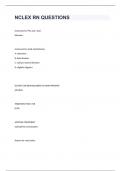
-
NCLEX RN QUESTIONS with complete correct answers
- Exam (elaborations) • 42 pages • 2024
- Available in package deal
-
- $18.49
- + learn more
NCLEX RN QUESTIONStreatment for PVC and v tach lidocaine treatment for atrial dysrhythmias A: adenosine B: beta blockers C: calcium channel blockers D: digitalis (digoxin) DO NOT GIVE BETA BLOCKERS TO WHAT PATIENTS ASTHMA TREATMENT FOR V FIB D FIB ASYSTOLE TREATMENT epinephrine and atropine Reason for chest tubes reestablish pressure in pleural space what type of space is in the pleural cavity negative calcium channel blockers are like __________ fo...
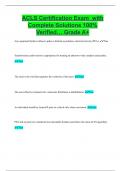
-
ACLS Certification Exam with Complete Solutions 100% Verified… Grade A+
- Exam (elaborations) • 27 pages • 2024
- Available in package deal
-
- $12.99
- + learn more
ACLS Certification Exam with Complete Solutions 100% Verified… Grade A+ Any organized rhythm without a pulse is defined as pulseless electrical activity (PEA). True Synchronized cardioversion is appropriate for treating an unknown wide complex tachycardia. True The aorta is the wall that separates the ventricles of the heart. False The most effective treatment for ventricular fibrillation is defibrillation. True An individual should be cleared-Ñ prior to a shock only when convenie...
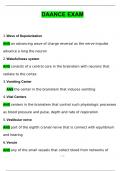
-
DAANCE Exam 2024 Questions and Answers (2024 / 2025) (Verified Answers)
- Exam (elaborations) • 36 pages • 2024
- Available in package deal
-
- $12.49
- + learn more
1. Wave of Depolarization ANS an advancing wave of charge reversal as the nerve impulse advance a long the neuron 2. Wakefullness system ANS consists of a central core in the brainstem with neurons that radiate to the cortex 3. Vomiting Center ANS the center in the brainstem that induces vomiting 4. Vital Centers ANS centers in the brainstem that control such physiologic processes as blood pressure and pulse, depth and rate of respiration 5. Vestibular nerve ANS part of the eighth crani...
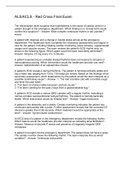
-
ALS/ACLS - Red Cross Final Exam
- Exam (elaborations) • 6 pages • 2023
-
- $9.99
- 1x sold
- + learn more
The resuscitation team suspects that hyperkalemia is the cause of cardiac arrest in a patient brought to the emergency department. Which finding on a 12-lead ECG would confirm this suspicion? - Answer- Wide-complex ventricular rhythm or tall, pointed T waves A patient with dyspnea and a change in mental status arrives at the emergency department. The healthcare team completes the necessary assessments and begins to care for the patient, including initiating cardiac monitoring, pulse oximetry,...
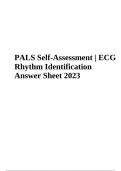
-
PALS Self-Assessment | ECG Rhythm Identification Answer Sheet 2024
- Exam (elaborations) • 39 pages • 2024
-
- $17.99
- + learn more
PALS Self-Assessment | ECG Rhythm Identification Answer Sheet 2024. Pediatric Rhythms (core PALS rhythms A to H; non-core rhythms I to M): A. Normal sinus rhythm B. Sinus tachycardia C. Sinus bradycardia D. Supraventricular tachycardia (SVT) E. Wide-complex tachycardia; presumed ventricular tachycardia (monomorphic) F. Ventricular fibrillation (VF) G. Asystole H. Pulseless electrical activity (PEA) I. SVT converting to sinus rhythm with adenosine administration J. Wide-complex tachycar...
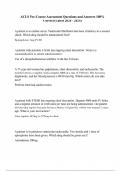
-
ACLS Pre-Course Assessment Questions and Answers 100% Correct (Latest 2024 - 2025)
- Exam (elaborations) • 11 pages • 2024
-
- $12.00
- + learn more
A patient is in cardiac arrest. Ventricular fibrillation has been refractory to a second shock. Which drug should be administered first? Epinephrine 1mg IV/IO A patient with possible STEMI has ongoing chest discomfort. What is a contraindication to nitrate administration? Use of a phosphodiesterase inhibitor in the last 24 hours A 57-year-old woman has palpitations, chest discomfort, and tachycardia. The monitor shows a regular wide-complex QRS at a rate of 180/min. She becomes diaphoret...
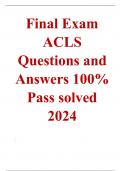
-
Final Exam ACLS Questions and Answers 100% Pass solved 2024
- Exam (elaborations) • 30 pages • 2024
-
Available in package deal
-
- $13.99
- + learn more
Final Exam ACLS Questions and Answers 100% Pass solved 2024 A patient experiences cardiac arrest, and the resuscitation team initiates ventilations using a bagvalve-mask (BVM) resuscitator. The development of which condition during the provision of care would lead the team to suspect that improper BVM technique is being used? Select the correct answer to this question. Rib fracture Esophageal injury Pneumothorax Hypertension Pneumothorax 1 A member of the res...
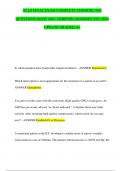
-
ACLS Final Exam 2023/2024 150 Questions and Answers
- Exam (elaborations) • 95 pages • 2023
-
- $25.99
- + learn more
ACLS Final Exam 2023/2024 150 Questions and Answers In which situation does bradycardia require treatment? - ANSWER Hypotension Which intervention is most appropriate for the treatment of a patient in asystole? - ANSWER Epinephrine You arrive on the scene with the code team. High-quality CPR is in progress. An AED has previously advised "no shock indicated." A rhythm check now finds asystole. After resuming high-quality compressions, which action do you take next? - ANSWER Establish IV ...
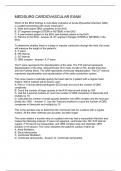
-
MED/SURG CARDIOVASCULAR EXAM
- Exam (elaborations) • 29 pages • 2023
-
Available in package deal
-
- $12.99
- + learn more
Which of the EKG findings is most likely indicative of Acute Myocardial Infarction (AMI) in a patient presenting with acute chest pain? A. Wide and bizarre QRS complexes in the EKG B. ST segment changes (STEMI or NSTEMI) in the EKG C. A saw-toothed pattern in the EKG saw-toothed pattern in the EKG D. Flat line in the EKG - Answer- B. ST segment changes (STEMI or NSTEMI) in the EKG To determine whether there is a delay in impulse conduction through the atria, the nurse will measure the len...
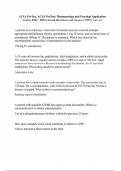
-
ACLS PreTest, ACLS PreTest: Pharmacology and Practical Application (Latest 2023 - 2024) Actual Questions and Answers 100% Correct
- Exam (elaborations) • 17 pages • 2024
-
Available in package deal
-
- $13.00
- + learn more
A patient is in refractory ventricular fibrillation and has received multiple appropriate defribillation shocks, epinephrine 1 mg IV twice, and an initial dose of amiodarone 300mg IV. The patient is intubated. Which best describe the recommended second does of amiodarone for this patient? 150 mg IV amiodarone A 35-year-old woman has palpitations, light-headedness, and a stable tachycardia. The monitor shows a regular narrow-complex QRS at a rate of 180/min. Vagal maneuvers have not been e...

Study stress? For sellers on Stuvia, these are actually golden times. KA-CHING! Earn from your study resources too and start uploading now. Discover all about earning on Stuvia


